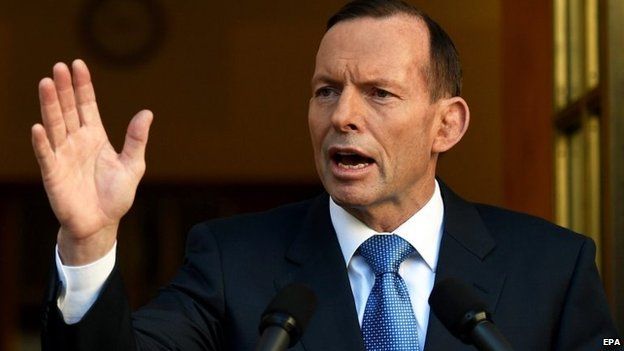Australia raises terrorism threat level - Tony Abbott
- Published

Australia has raised its terrorism threat level from medium to high, Prime Minister Tony Abbott has announced.
The move comes in response to growing concern over the domestic impact of militant conflicts in Iraq and Syria.
Security officials were concerned by the growing number of Australians "working with, connected to or inspired by" Islamist groups, Mr Abbott said.
But he said that there was no specific intelligence regarding a planned attack.
"I want to stress that this does not mean that a terror attack is imminent. We have no specific intelligence of particular plots," he told a press conference.
"What we do have is intelligence that there are people with the intent and capability to mount attacks here in Australia."
Officials say dozens of Australians have gone to fight for jihadist groups such as Islamic State and Jabhat al-Nusra (also known as the al-Nusra Front) in the Middle East.
They are worried about the impact of both returning fighters and supporters of these groups on domestic security.
'Elevated concern'
It is the first time Australia has moved from medium to high - the second-highest rank - since the threat level system was introduced in 2003.
"Medium" means an attack could occur. It is followed by "high", which means an attack is likely and then extreme, meaning an attack is imminent or has occurred.
Mr Abbott said that while the move would not make a great difference to daily life, people could notice more security at airports, ports, military bases, government buildings and large public events.
Earlier this week, Australia's top spy David Irvine said that the threat had been building over the past year and he had an "elevated level of concern".
Officials say at least 60 Australians are believed to be fighting with jihadist groups in Syria and northern Iraq, and 15 Australians have been killed so far in these conflicts, including two suicide bombers.
About 100 more Australians are thought to be actively supporting these groups, they say.
In response, Australia has restricted citizens from travelling to certain areas to join militant groups, and is installing new counter-terrorism units and biometric screening at all international airports.
On Wednesday, police raided an Islamic centre in Queensland and arrested two men.
Both have been charged with offences linked to recruiting, facilitating and funding people to travel to Syria to engage in hostile activities.
- Published10 September 2014
- Published27 August 2014
- Published6 August 2014
- Published5 August 2014
- Published11 August 2014